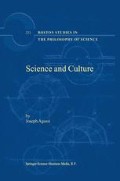Abstract
For logical reasons, progress in the dispute about the choice of a criterion of progress seems impossible, as it renders any move question begging. Our criterion of progress may limit critics by permitting them only criticisms that accord with it. Openness to criticism thus becomes a criterion that on a few counts is necessary but insufficient, especially for science, where progress is most pronounced. The need for criteria for progress is the need not to fall for mockprogress. This renders criteria for progress proper unnecessary; it is enough to have criteria for possible progress. Instituting such criteria might enable the now so scarce encouragement of the young. Since much pseudo-progress is due to the confusion of a program with its execution, this change will also prevent much pretense. But the chief aim here is to reduce the harm that current practice of acknowledgment causes.
Access this chapter
Tax calculation will be finalised at checkout
Purchases are for personal use only
Preview
Unable to display preview. Download preview PDF.
Notes
See Thomas S. Kuhn, The Structure of Scientific Revolutions, 1962. For extended discussions of his views, see my Science and Society, 1981 and my The Gentle Art of Philosophical Polemics, 1988.
Kuhn’s pragmatism is a meta-criterion. He ignores this. He both asserts and denies that he is a relativist. The description here of the rift between the two schools, accords with Pierre Duhem, The Aim and Structure of Physical Theory,1956. Concerning conversion in science and Kuhn’s approval of it, see I. Bernard Cohen, Revolutions in Science,1987, and my review of it in my The Gentle Art of Philosophical Polemics,1988, 123–130, esp. 128.
For Bacon’s doctrine of prejudice, see my “The Riddle of Bacon”, Studies in Early Modern Philosophy, 2, 1988, 103–36. See also my The Gentle Art of Philosophical Polemics, op. cit.
See my “Duhem versus Galileo”, republished in my The Gentle Art of Philosophical Polemics, op. cit.
Among those who demand to limit criticism to constructive criticism are C. G. Hempel, Thomas Kuhn, Paul Feyerabend, and Imre Lakatos. See my “Kuhn’s Way”, Philosophy of the Social Sciences, 32, 2002, 394–430, 411.
See Gilbert Ryle, “Dialectic in the Academy”, in Renford Bamborough, editor, New Essays on Plato and Aristotle, 39–68. See also his contribution to Proceedings of the 3rd Symposium on Aristotle, 1968, 69–79.
See K. R. Popper, The Logic of Scientific Discovery, 1959, Chapter 5, and my “Sensationalism”, reprinted in my Science in Flux, 1975.
See my “The Confusion between Science and Technology in Standard Philosophy of Science” reprinted in my Science in Flux and my Technology: Philosophical and Social Aspects,1985.
See Chapter 1.6 and Chapter 2.5 for more details about superstition; see Chapters 4.2 and 4.6 for more details about progress in art.
See my Faraday as a Natural Philosopher,1971. See also the essay on him in the virtual Encyclopedia Britannica,which derides this book.
See Owsei Temkin, The Double Face of Janus,1977. See also my Faraday as a Natural Philosopher.
See my Towards a Rational Philosophical Anthropology,1977. See also my A Philosopher’s Apprentice: In Karl Popper’s Workshop,1993.
For Duhem’s continuity theory see my Towards an Historiography of Science, History and Theory, Beiheft 2, 1963, 1967, Chapter 9.
See my “Sociologism in the Philosophy of Science”, reprinted in my Science and Society,1981.
Author information
Authors and Affiliations
Rights and permissions
Copyright information
© 2003 Joseph Agassi
About this chapter
Cite this chapter
Agassi, J. (2003). Minimal Criteria for Intellectual Progress. In: Science and Culture. Boston Studies in the Philosophy of Science, vol 231. Springer, Dordrecht. https://doi.org/10.1007/978-94-017-2946-8_15
Download citation
DOI: https://doi.org/10.1007/978-94-017-2946-8_15
Publisher Name: Springer, Dordrecht
Print ISBN: 978-90-481-6234-5
Online ISBN: 978-94-017-2946-8
eBook Packages: Springer Book Archive

